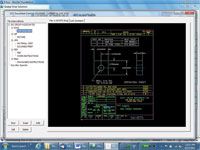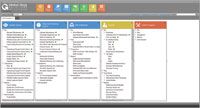by Chris Pinaire, (left) director of new implementations, Global Shop Solutions.
Daniel Carranco, (right) director, continuous improvement, Global Shop Solutions.
Enterprise Resource Planning (ERP) software promises end-to-end automation in manufacturing
Enterprise Resource Planning (ERP) systems offer the prospect of a one-stop software shop that can run most all facets of a business, whether it’s finance and accounting, customer relationship management, e-commerce, planning and scheduling, human resources, logistics inventory management, data analytics… the list goes on.
ERP packages tailored for manufacturing customers expand that list of capabilities to include data collection from the shop floor, shop management, estimating, cost analytics—including real time tracking of raw materials spot prices and more. All of it tied together into a single package that enables subsystems to ‘speak’ with one another instantaneously.
It’s an attractive proposition: costs can be reduced, produ cts and parts can be tracked and traced through the entire manufacturing cycle and even beyond, and accurate, cost efficient bids and estimates can be put together for customers on the fly.
cts and parts can be tracked and traced through the entire manufacturing cycle and even beyond, and accurate, cost efficient bids and estimates can be put together for customers on the fly.
But it’s also a bit intimidating, especially for smaller sized manufacturing operations that may not have much experience with enterprise software systems. ERP isn’t a small investment, big as the payoff may potentially be, and it pays to understand when and why to take a step this big.
What follows is a question and answer session with Chris Pinaire, director of new implementations, and Daniel Carranco, director, continuous improvement for Global Shop Solutions. Global Shop Solutions is one of a number of providers that specialize in ERP systems for customers in the manufacturing sector.
Why should a small to medium sized manufacturer implement an ERP system and what are some of the signs that it’s time for a manufacturer to consider moving to an ERP system?
Chris Pinaire: Demand for high quality products with attractive price points made yesterday, i.e. fast, is table stakes for any sized manufacturers today. Manufacturing is complex, and it simply takes more than a company of smart, passionate and hardworking people to get the job done. The people power needs to be coupled with process and technology so you can deliver a quality part or product on time, every time, and know exactly what it cost you to make it.
There are a couple signs that typically signal it’s time for a manufacturer to move to a ERP system for the first time, or to a new ERP system. First, there are quantifiable signs, such as: do they know their costs, do they know their inventory, can they flow their inventory and operations data to an accurate financial statement, and do they have real time labour and material data from the shop floor?
 These are tricky questions to get honest answers to. For example, many manufacturers feel they know their true cost. But until you can see your costs broken down at the component level like freight, labour, outside services, overhead, other and material for each job in near real time, you don’t know your true costs.
These are tricky questions to get honest answers to. For example, many manufacturers feel they know their true cost. But until you can see your costs broken down at the component level like freight, labour, outside services, overhead, other and material for each job in near real time, you don’t know your true costs.
Second, if the ‘look and feel’ of the manufacturer is one where every job is a hot job, the shop floor is in chaos, management is using spreadsheets and notebooks, jobs are put on tack boards and you’re reacting to crises versus predicting them, then your manufacturing needs a system to create order, process and control, which will improve quality and increase velocity.
The business challenges ERP helps solve can be endless, as any manufacturer, no matter how good they are, can always be better. They can always integrate more, automate more, customize more, improve quality, costs, purchasing and velocity on the shop floor. At the highest level, the typical business challenges ERP solves for a manufacturer is delivering quality parts, on time every time with certainty about your job costs and managing all the data and activity in real time. We recommend manufacturers evaluating ERP software take a manufacturing health test, which gives them a grade on eight aspects of manufacturing that most companies struggle with. The goal of the health test is to reinforce they are not alone with these struggles and shows them what their manufacturing could be like in the future.
How complex and disruptive is ERP implementation?
CP: ERP implementation is challenging, but in life, normally anything worthwhile takes grit, determination and effort. Global Shop Solutions does everything direct – sales, service, software development, implementation, and consulting. We feel this philosophy provides manufacturers an advantage during the implementation process because the team you are relying on are direct employees of the company that developed the software and technology. All of our implementation consultants have previous hands on management experience in manufacturing and are laser focused on the one product we develop and implement—ERP software.
The implementation of any ERP system is tough, but once it’s complete, everyone will be a in a better place because of it. Leadership has to have buy-in on getting the system implemented otherwise it’s just another obstacle.
What should manufacturers consider to ensure they have the right type of ERP for their business?
Daniel carranco: A manufacturer should ensure he has buy-in from management, ownership and the right implementation team in place with the right incentives. And a manufacturer should carefully evaluate the company the ERP system is coming from to be sure the right level of support and service will be available to them for years and decades to come.
The manufacturer needs to make sure the ERP can handle their core business needs with the flexibility to handle the one off situations that are not everyday. Make sure you pick someone you can trust and you feel comfortable with because choosing a ERP system for your business is like choosing a life partner, it should be a system you choose one time and will grow with you.
What are the top three advancements in ERP systems?
DC: First there’s cloud computing for speed, security, and access. Then there’s machine integration for better costing and lights out manufacturing, and finally AI and deep learning for predictive intelligence and analytics
 With today’s digitally connected manufacturing operations how does an ERP system fit in?
With today’s digitally connected manufacturing operations how does an ERP system fit in?
DC: An ERP system is the centre of the spoke for Industry 4.0. Your ERP database should be the central location for all data being collected from machines, employees, vendors, etc. Nearly every day we have a customer calling us and asking us to integrate with a different type of machine or system so the data can be accessed through our ER.
What maintenance issues does a manufacturer have to be concerned about when operating an ERP system? Will specialized IT staff be needed, or retraining for existing ones?
DC: A manufacturer running an ERP system will either need to leverage the ERP company for IT support, retain outsourced IT support or have an internal IT employee. Nearly half of our customers do not have a full time IT employee due to the support they receive from us. No specialized staff is needed; training is provided.
Typically, a company will nominate an employee as the ERP champion. This could be the plant manager, CFO, anyone really, to make sure everything is running smooth and the employees continue to improve their use of the system as new functionality becomes available.
How will ERP systems for manufacturing change in the future?
DC: ERP systems will become more connected, integrated and intelligent in the future. Leveraging maturing technology like the cloud, AI, RFID and voice search will enable an ERP system to become relied upon even more by a manufacturer. Additionally, ERP systems are starting to extend themselves into e-commerce by connecting to a manufacturer’s website, supplying real time data about work in progress, shipping, inventory and performing purchasing transactions.
 How does an ERP provider like Global Shop Solutions support manufacturer customers during and after implementation?
How does an ERP provider like Global Shop Solutions support manufacturer customers during and after implementation?
DC: Global Shop Solutions prides itself on customer retention and credits our ongoing training and continuous improvement for this success.
The company offers ERP Boot Camp which is face to face, classroom style training that is free to all customers at our headquarters in The Woodlands, TX. ERP Boot Camp immerses the user in our system from quote to cash so they leave our facility confident and capable of improving their business. Next, the company offers Advanced User Training, which is also face to face classroom style training at low cost that takes them from good to great on specific topics.
Next, the company offers our quarterly User Conference which offers nearly 20 classes: face to face classroom style training and networking that gives them a personalized plan to simplify their manufacturing. Last but not least is Friday Features; this is free online training every Friday that shows customers something core in the system, something new in the system, and shares a case study of a customer that is winning with our ERP software.
All of this group style training is supplemented with virtual training, on site consulting and our FastCheck ROI which sends one of our most experienced consultants to your facility to identify areas you can improve and products that you can leverage. SMT
